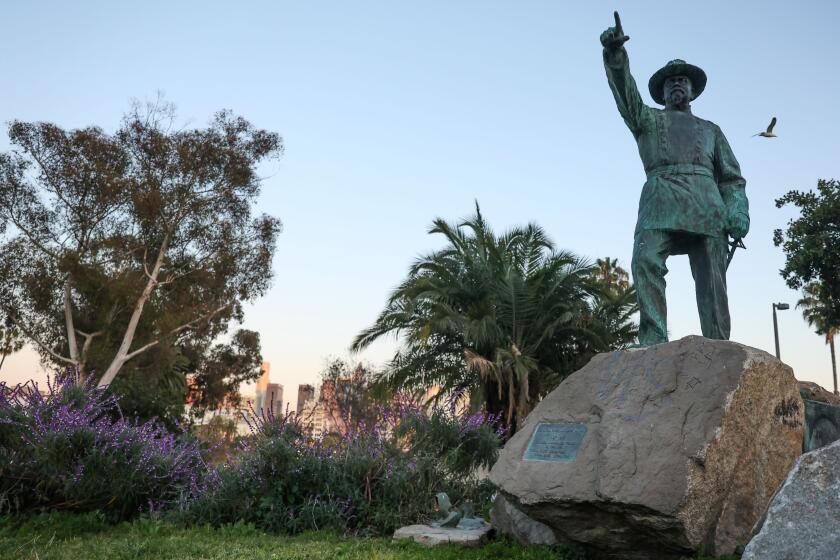Diotima Quartet premieres Boulez work 64 years in the making
Pierre Boulez must not have gotten the memo about a work of art never being finished, merely abandoned. Boulez, who died last year at age 90, had the hardest time letting go of his works.
Take “Livre Pour Quatuor,” Révisé (“Book for Quartet,” Revised), his only string quartet, which took 64 years to edit. A portion of the piece was given its premiere by the Paris-based Diotima Quartet as part of the Jacaranda music series Saturday night at First Presbyterian Church in Santa Monica.
Boulez was 80 when he worked on revising “Livre” with the Diotima Quartet — violinist Yun-Peng Zhao, violist Franck Chevalier and cellist Pierre Morlet, cellist. (Second violinist Constance Ronzatti had not yet replaced Guillaume Latour.) Together they found ways of moderating some of the rhythmic extremes of the music Boulez composed in 1948 when he was 23, even letting a bit of coloristic warmth into the firebrand’s largely cerebral score, which can run 40 minutes complete. There is no definitive version.
Because the title, “Livre,” refers to book pages that can be detached and reordered, Boulez approved of partial performances. The Diotima Quartet, whose name is a nod to German Romanticism and Luigi Nono’s string quartet “Fragmente-Stille, an Diotima,” allowed the austere piece to unfold organically with exacting and subtle application of tone color while maintaining Boulez’s incisive rhythms.
The shortest Jacaranda concert in my memory also featured quartets by Eric Tanguy, Hugh Levick and Henri Dutilleux. At just under 90 minutes, the program emerged as a powerful reminder that less can be a lot more.
The opening piece, Tanguy’s affectionate Quartet No. 2 (2000), received an expert reading from Diotima. It’s a score contoured in the manner of Debussy and Ravel, French to its roots. The musicians mastered every ebb and flow of Tanguy’s mostly consonant work, which included a slow movement that unashamedly skirted the edge of sentimentality.
Levick’s jazzy 15-minute “Saxophone for String Quartet” (No. 4) had its U.S. premiere. Levick, who founded and directs L.A.’s Hear Now Music Festival, attempts to graft jazz techniques onto a traditional string quartet with mixed results. Although the work never quite found a convincing stylistic continuity, it did give the players a chance to display a more naked virtuosity, including a solo passage for violist Chevalier, a bass-like solo for cellist Morlet and a rhythmic section in which the ensemble, navigating changing time signatures, suggested a drum solo.
The program closed with a luminous rendition of Dutilleux’s only quartet, “Ainsi la Nuit” (“Thus the Night”). In seven connected movements, the 20-minute score from 1976 revels in shifting textures — pizzicato figures, glassy harmonics, atonal harmonies and sliding lines. Somehow the quartet made it all hang together like precise stanzas in a poem hinting at night’s elusive qualities.
The quartet’s ravishing sonority, seamless ensemble playing and controlled exuberance made one wish for something more expansively Romantic on the program. In fact, the ensemble does play more traditional works, like Beethoven’s late quartets, and it was scheduled the next day to perform Schubert’s “Rosamunde” Quartet in Fullerton.
As this concert suggested, however, the Diotima Quartet is an invaluable, eloquent advocate for even the most challenging of modern scores. Give the group a listen. It returns to Jacaranda on Saturday for a program of works by Schoenberg, Webern and Berg.
♦ ♦ ♦ ♦ ♦ ♦ ♦ ♦ ♦ ♦
Diotima Quartet
Where: First Presbyterian Church of Santa Monica, 1220 2nd St.
When: 8 p.m. Saturday
Tickets: $20-$45
Information: (213) 483-0216, www.jacarandamusic.org
SIGN UP for the free Essential Arts & Culture newsletter »
Follow The Times’ arts team @culturemonster.
ALSO
Times art critic Christopher Knight’s latest reviews
Times theater critic Charles McNulty’s latest reviews
Times architecture critic Christopher Hawthorne’s latest columns
Times music critic Mark Swed’s latest review
More to Read
The biggest entertainment stories
Get our big stories about Hollywood, film, television, music, arts, culture and more right in your inbox as soon as they publish.
You may occasionally receive promotional content from the Los Angeles Times.






